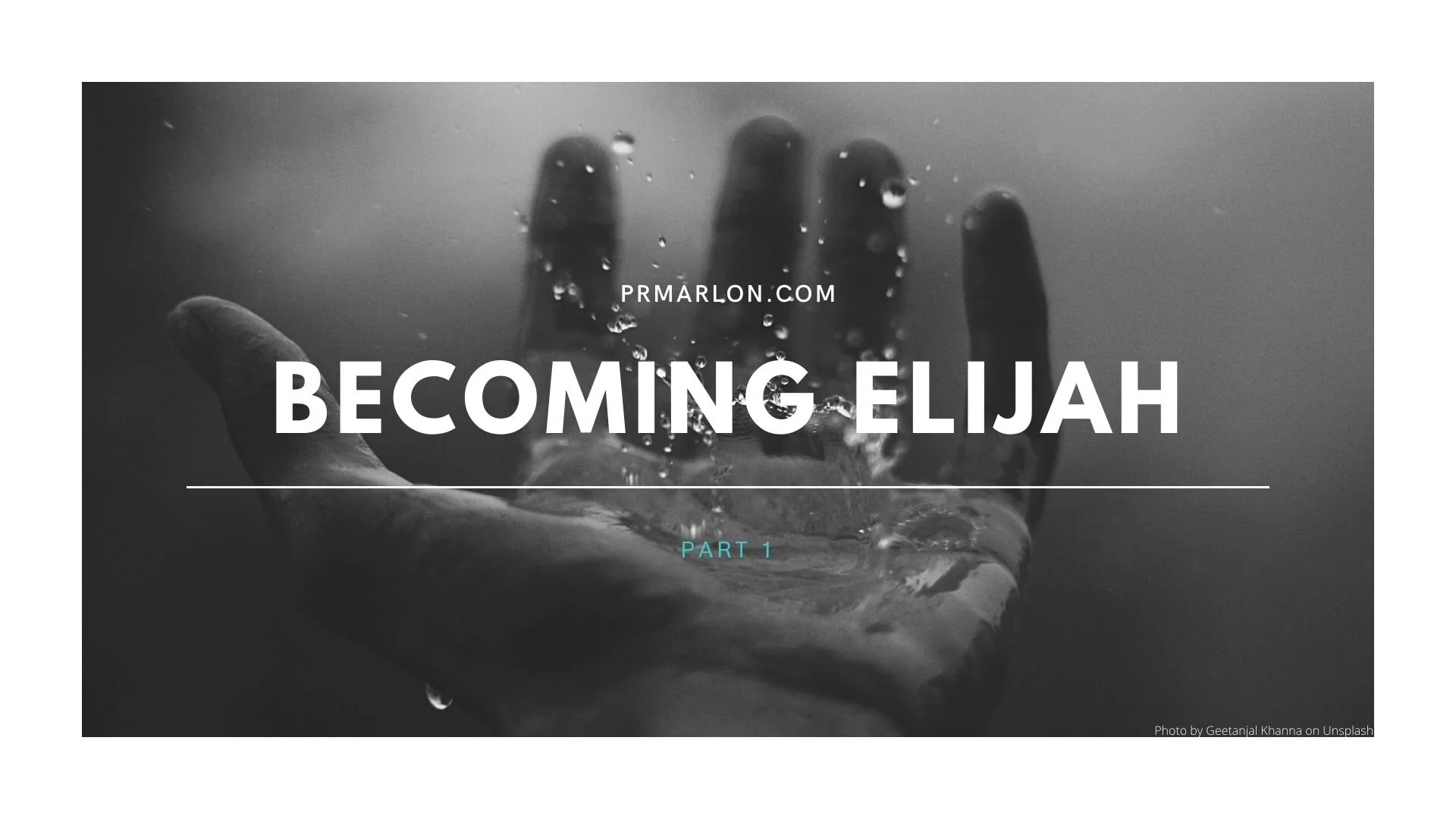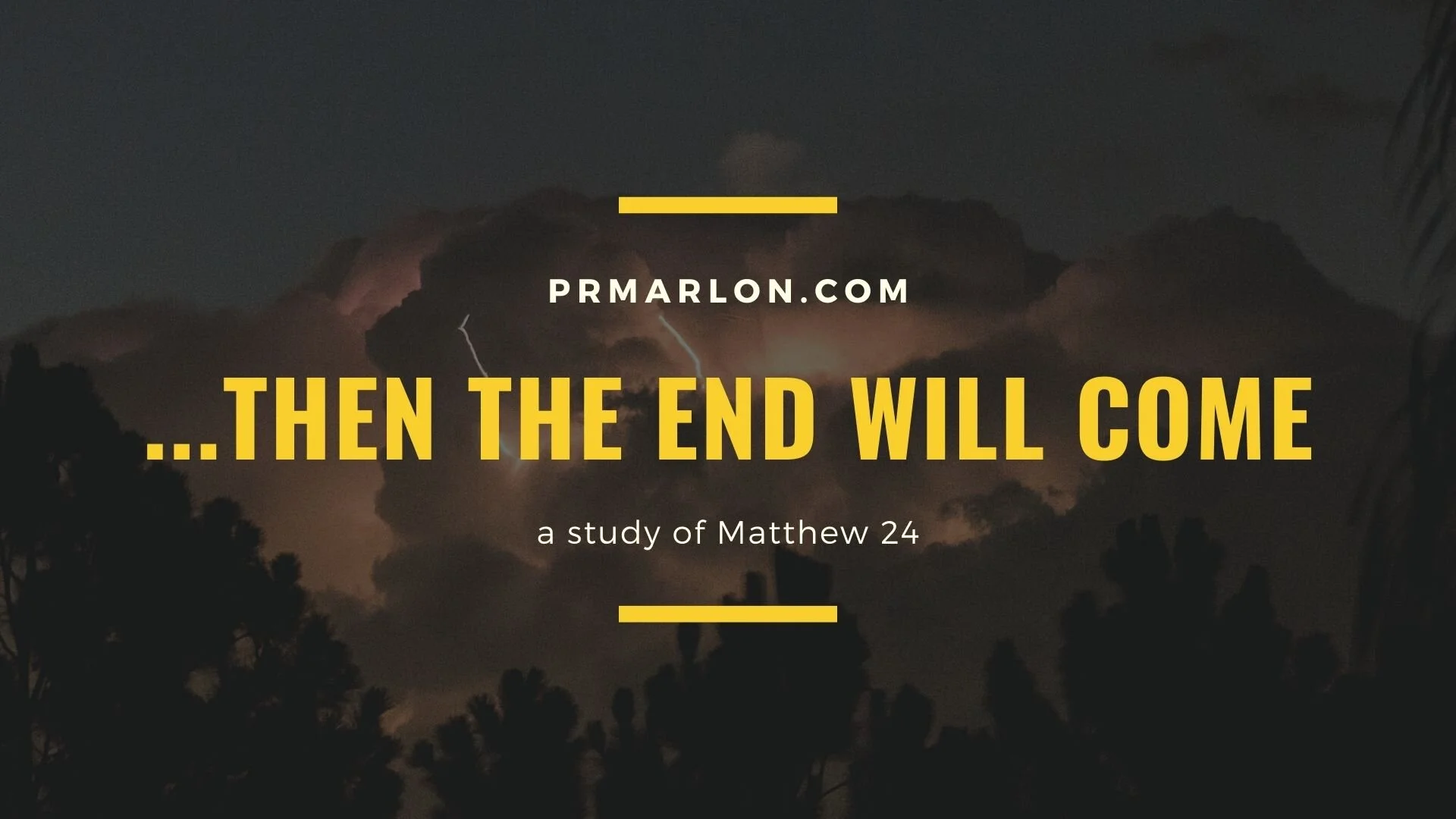Becoming Elijah
And Elijah the Tishbite, of the inhabitants of Gilead, said to Ahab, “As the Lord God of Israel lives, before whom I stand, there shall not be dew nor rain these years, except at my word.”
- 1 Kings 17:1 NKJV
Elijah barges into the story unannounced. We don’t really know anything about him before this and all we have at this point is a name and a city of origin. The name Elijah means “Yahweh is my God.” And all we know about his hometown is that it was located east of the Jordan River and that it was so small and insignificant that scholars are not sure about its exact location.
Elijah claims that the God of Israel is alive and controls rainfall essentially attacking Baal on his own turf. “Baal worshipers believed that their storm god made rain, unless, of course, it was the dry season and he needed to be brought back from the dead.” (House, P. R. (1995). 1, 2 Kings (Vol. 8, p. 213). Nashville: Broadman & Holman Publishers.) Elijah’s statement essentially claimed that the God of Israel is the true God, the only living God who is able to hear and answer prayers.
Cultural Background
Elijah appears during a spiritual crisis. Sin has invaded the land, and if not stopped, will soon engulf all in tragic ruin. There is an ever-increasing tide of apostasy that was flooding the land. The Israelites were putting more and more trust in Baal.
Baalism existed as a religion for several centuries in various ancient Near Eastern countries. Its prominence in Canaan and Phoenicia is especially important for understanding 1, 2 Kings, since it is from those cultures that the major influence on Israel and Judah came. M. Smith concludes that “the Phoenician baal of Ahab and Jezebel was a storm-god. The extrabiblical evidence indicates that the baal of Carmel and Baal Shamem were also storm gods.” Thus, Baal worshipers believed that their god made rain, which is a quite important detail in an agricultural community. Elijah apparently prays for a drought to prove that Yahweh, not Baal, is in charge of crop-enriching rains.
- House, P. R. (1995). 1, 2 Kings (Vol. 8, p. 210). Nashville: Broadman & Holman Publishers.
How did they explain the periods of drought?
Given the lack of rain in specific seasons of the year in that region, Baal cultists had to explain why Baal could not guarantee rain at all times. They said that Baal submitted to Mot, the god of death, each year, which caused drought and barrenness to the land. Eventually Anat defeated Mot and freed Baal, which restored fertility. A. Hauser believes: “The Canaanites’ equating of fertility with the presence of a live and vibrant Baal, who as the storm god sent the life-preserving rains onto the land, and their equating of drought and famine with the periodic death of Baal, set the stage for the stories in 1 Kings 17–19.” Elijah must find a way to expose Baal as a nonentity and at the same time reestablish Yahweh as sovereign in the people’s minds.
- House, P. R. (1995). 1, 2 Kings (Vol. 8, pp. 210–211). Nashville: Broadman & Holman Publishers.
Standing Before God
Elijah introduces himself as a person who stands before God. The posture of standing in the presence of an important person indicates readiness to serve (see Daniel 7:10). But I could not help but wonder how my life would be different if I was constantly aware that I am standing before God, in other words, how would my life be different if I lived in the presence of God? I know that God can see me and that I cannot hide from Him (Hebrews 4:13) but that does not automatically mean that I live consciously aware of God’s presence. But imagine if we all lived our lives consciously aware that we are living in the presence of God. How different would our lives be? I think of the example of Brother Lawrence, a humble lay monk who developed a simple way of praying from his heart which he called “practicing the presence of God.” And he learned to commune with God continuously, not only in church or personal devotions, but also as he worked in the kitchen, ran errands, or listened to people. (source)
“We ought not to be weary of doing little things for the love of God, who regards not the greatness of the work, but the love with which it is performed.”
- Brother Lawrence, The Practice of the Presence of God
Imagine how different our lives would be if we lived consciously in the presence of God and demonstrated our love for God in everything we did?
Can we, like Elijah say, as the God of the Bible lives, before whom I stand?
Does our life reflect the truth that we live in the presence of a holy, powerful, loving God?
I remember being told once that in order to preach like thunder one must live like lighting.
Run Away!
Then the word of the Lord came to him, saying, “Get away from here and turn eastward, and hide by the Brook Cherith, which flows into the Jordan. And it will be that you shall drink from the brook, and I have commanded the ravens to feed you there.”
- 1 Kings 17:2-4 NKJV
Place yourself in Elijah’s shoes. You just demonstrated incredible boldness and faith, you put your life on the line to deliver an unpopular message from God. You were faithful, you were brave, you believed in God, and faithfully did your duty. Now as a reward, God tells you to run and hide. You did everything right, you obeyed God, and as a result, now you have to hide? Meanwhile, the king and his wife who are leading God’s people into idol worship continue to live a life of luxury in the palace.
Would you question God’s decision? Would you be motivated to continue to be faithful to God if doing so only seemed to make life more difficult for yourself? If faithfulness to God does not automatically result in a life of comfort and ease would you want it? What motivates you to be faithful to God? What motivates you to go and make disciples of all nations? (Matthew 28:18-20) Do you do it expecting a great reward? An easy life? Did you stop sharing the gospel because it was making life more difficult?
I believe that Elijah shared what He did because he believed that the truth he shared had the power to heal its hearers. Elijah knew that for the king to continue on the path of idolatry would ultimately lead to terrible things. It was love for the king and the children of Israel that led Elijah to share a message from God, the truth, a message of judgment, that would serve as a warning and an invitation to repent and receive salvation.
Prophets are often perceived as enemies when in reality they are the only links to a future worth living.
Like Elijah, we should be committed to sharing a truth that heals its hearers. And that truth can only be found in God. When we seek God He promises we will find Him (Jeremiah 29:13) but we have to really want to find Him, with all of our hearts.
It could be argued that the key issue taking place during the reign of Ahab is not that Israel wanted to reject Yahweh and choose Baal, but rather to serve them both. (B. S. Childs, Old Testament Theology in a Canonical Context [Philadelphia: Fortress, 1986] 65.) But God is not satisfied in being one among many, or even the first or primary God, God is the only God. Elijah is helping the people remember that there are no other gods and there is no true salvation outside of God and that God is the only One capable of providing for all of our needs.
““There is one God, there is no god but God, and there is no rest for any people who rely on any god but God.””
Unbelief was fast separating the chosen nation from the Source of their strength. The loving thing to do is to remind them of the ultimate reality of their current choices. The drought would help the king and the entire nation of Israel to realize their dependence on God. I see it not so much as God punishing them as God revealing to them that Baal or any other god was completely incapable of providing for their needs. The true God is not only a God who saves you and gives you eternal life, He is also the God who protects and provides for you every day of your life.
God Provides
So he went and did according to the word of the Lord, for he went and stayed by the Brook Cherith, which flows into the Jordan. The ravens brought him bread and meat in the morning, and bread and meat in the evening; and he drank from the brook.
- 1 Kings 17:5-6 NKJV
Elijah obediently followed God’s directions and experienced God’s provisions in a supernatural way. It is very important to highlight that even though Elijah was not living a life of luxury he had everything he needed. Even though the drought has begun Elijah has resources because He trusts and obeys the God who controls all the resources. God protects Elijah and does not withhold from him anything he needs.
Elijah was not helped by people, not by a powerful family or a rich benefactor. Elijah was helped by God and God chose to use ravens to bring food to Elijah. As Elijah spent time in the wilderness, uncomfortable as it was, he was being prepared by God for the tasks ahead. God was teaching Elijah about faith and trust, that He cared and could provide for Elijah despite the drought and persecution.
I have had many people approach me concerned about end-time events. It is only natural for us to be concerned. My response tends to be the same, make sure you are faithfully looking for ways to do what God is calling you to do to bless those around you, and God will provide for your needs. Elijah was faithful to God’s calling and his life was not easy, but God always provided for him. Elijah was being persecuted and there was a drought in the land, but he never lacked anything he needed to survive.
And my God will give you everything you need because of His great riches in Christ Jesus.
- Philippians 4:19 New Life Version
Ravens?
God could have provided Elijah with a food pantry with enough food to last him however long he would be at the Brook Cherith. But instead, God provided him with food twice a day. And the food came from birds. Imagine Elijah, starting to feel hungry as meal time approaches and he has nothing, and he just looks to the sky, having no power over the birds, not knowing if they will come today.
What if God forgot? Just for one day, or just for one meal, what if God was too busy or got distracted?
Not to mention that ravens were unclean birds (Leviticus 11:15), and apparently had been known even to neglect their young (Job 38:41). Couldn’t God have used another means of providing for Elijah? I mean how much food could one raven bring? How many ravens are we talking about here? I imagine bakers in the area growing increasingly concerned about their bread being stolen by birds, and people struggling to enjoy a family barbecue because the ravens keep stealing the best cuts fresh from the grill.
I say that jokingly since meat and bread typically represent food and sustenance in general and the way it’s worded here probably means that Elijah was not going hungry, he was eating well, especially when you consider the drought in the land.
Jesus taught us to pray for our daily bread (Matthew 6:11) and when I look at my life I realize that this has always been true. I did not always know where my bread would come from, but I have never lacked. Oftentimes we worry about the bread for next month or next year, and we lose sleep over it, get sick over it, begin to doubt God even. But when we stop to think about it, we realize it’s not the first time this happens, God has always provided before, He will continue to provide. We may not know the future but we can know the One who holds the future.
Elijah was not in a comfortable situation but he learned, like many of us are learning, that God can be trusted. Elijah learned that God cared, that God loved him and never forgot about him and his needs. That is the God who we worship, the God who sent His only Son to die on a cross that we might live. A God who loves and invites us to love those around us. A God who calls us to share with others the incredible things He has done for us.
Meanwhile, everyone else is experiencing a different reality.
Drought
Night after night, throughout the doomed land, cries and entreaties arise from the priests of Baal. But no clouds appear in the heavens by day to hide the burning rays of the sun. No dew or rain refreshes the thirsty earth. The word of Jehovah stands unchanged by anything the priests of Baal can do. Baal is unable to provide rain and prayers to him have no effect on the God of Israel.
Instead of recognizing this Jezebel blames Elijah and his message for making the gods angry. Only the death of Elijah will appease the gods and put an end to their troubles. Jezebel doubles down that Elijah is the problem ignoring the powerlessness of her gods. She insists that the answer is not to turn to the God of Israel but to kill Elijah who apparently had angered Baal.
The Goal
Ultimately the point of the drought was to remind people of their dependence on God and how He was the only One able to provide for them. He is the only true God and is worthy of worship. He is the living God who hears and answers prayers.
Do I have any pleasure at all that the wicked should die?” says the Lord God, “and not that he should turn from his ways and live?
-Ezekiel 18:23 NKJVCast away from you all the transgressions which you have committed, and get yourselves a new heart and a new spirit. For why should you die, O house of Israel? For I have no pleasure in the death of one who dies,” says the Lord God. “Therefore turn and live!”
- Ezekiel 18:31-32 NKJVSay to them: ‘As I live,’ says the Lord God, ‘I have no pleasure in the death of the wicked, but that the wicked turn from his way and live. Turn, turn from your evil ways! For why should you die, O house of Israel?’
- Ezekiel 33:11When I shut up heaven and there is no rain, or command the locusts to devour the land, or send pestilence among My people, if My people who are called by My name will humble themselves, and pray and seek My face, and turn from their wicked ways, then I will hear from heaven, and will forgive their sin and heal their land.
- 2 Chronicles 7:13-14
The ultimate goal is salvation. Salvation is available and free, the children of Israel just need to stop worshipping false gods who are unable to help them. In other words, stop doing things that will only hurt you. Open your eyes and see where this path leads. Return to God and receive His salvation.
Practical Application
I don’t believe that you stumbled upon this post by accident.
What is God calling you to turn from?
What are the idols that have taken the place of God in your life?
What is keeping you from spending time with God daily in prayer and Bible study?
What makes it more difficult for you to hear God’s voice in your heart?
Are you afraid of the challenges that will come when you do what God is calling you to do? If so, do you prefer to face life while running away, or at best avoiding God, or would you rather face life’s biggest challenges with God on your side?
Jesus is coming soon. Things will get more difficult. But we serve a mighty God who is capable of supplying all of our needs. God will not remove the difficulties but will guide us step by step leading us through the difficulties, providing for all our needs step by step, one day at a time.
More Challenges
The fact that God loves us and is able to supply all of our needs is not to be taken to mean that life will be easy.
And it happened after a while that the brook dried up, because there had been no rain in the land.
- 1 Kings 17:7 NKJV
The brook that Elijah depended on dried up. After all, there was a drought in the land. We don’t know how long Elijah was camping by the brook, but we know that it dried up.
Had God forgotten about Elijah?
Had God run out of love?
Had Elijah done something bad?
Was God angry with Elijah?
Find out in my next post.
For further reading check out The Story of Prophets and Kings as Illustrated in the Captivity and Restoration of Israel. Pacific Press Publishing Association.







